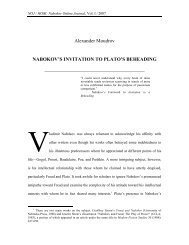domesticated translation: the case of nabokov's translation of alice's
domesticated translation: the case of nabokov's translation of alice's
domesticated translation: the case of nabokov's translation of alice's
You also want an ePaper? Increase the reach of your titles
YUMPU automatically turns print PDFs into web optimized ePapers that Google loves.
NOJ / НОЖ: Nabokov Online Journal, Vol. II / 2008<br />
Alice’s intelligence and politeness – <strong>the</strong> main characteristics <strong>of</strong> her speech. He also<br />
transposes <strong>the</strong> word “fall” with <strong>the</strong> word “ispytanie” (“trial”) which is also characteristic<br />
<strong>of</strong> a high literary style.<br />
Obviously, Nabokov adapts <strong>the</strong> source text for readers familiar with a<br />
sophisticated vocabulary. For instance, in <strong>the</strong> conversation between Alice and <strong>the</strong><br />
Caterpillar, Nabokov renders <strong>the</strong> expression “short remarks” as “skupa na slova” which<br />
means “chary <strong>of</strong> words” and ascribes elegance and sophistication to <strong>the</strong> narrator’s voice.<br />
When she is talking to Alice, <strong>the</strong> Duchess uses <strong>the</strong> word “uvol’te” which is an archaic<br />
word in Russian and means “leave me in peace”/”do not force me to do something.”<br />
Sometimes Nabokov intentionally embellishes <strong>the</strong> text with additions and<br />
substitutions to make it sound more archaic. When Carroll refers to <strong>the</strong> dialogue between<br />
Alice and <strong>the</strong> Caterpillar, he constantly uses <strong>the</strong> verb “to say,” probably stressing <strong>the</strong><br />
<strong>of</strong>ficial and superior tone <strong>of</strong> <strong>the</strong> Caterpillar. Nabokov comes up with a variety <strong>of</strong> Russian<br />
verbs: “sprosila” (“asked”); “otvetila” (“answered”); “molvila” (an archaic verb which<br />
means “said”/“pronounced”); “progovorila” (“uttered”), “reshila” (“decided”),<br />
“prikazala” (“ordered”) and “osvedomilas’” (ano<strong>the</strong>r archaic verb with almost <strong>the</strong> same<br />
meaning as “asked” or “inquired”). Sometimes Nabokov intensifies <strong>the</strong> meaning <strong>of</strong> <strong>the</strong><br />
verb used in <strong>the</strong> original, as in <strong>the</strong> conversation between Alice and <strong>the</strong> Pigeon: <strong>the</strong> verb<br />
“ubiraisia” (“get out”) is used instead <strong>of</strong> “said <strong>the</strong> Pigeon in a sulky tone”. The same<br />
intensification <strong>of</strong> verbal forms may be observed in <strong>the</strong> conversation between Alice and<br />
<strong>the</strong> Duchess who is said to have “riavknula” (“roared”) and “otrezala” (“cut short”).<br />
The major part <strong>of</strong> <strong>the</strong> work is in a dialogue form – Alice’s conversations with <strong>the</strong><br />
peculiar creatures she encounters reflect <strong>the</strong> social problems <strong>of</strong> Victorian times. The
















